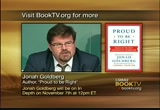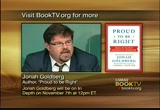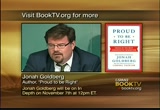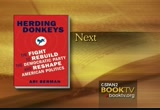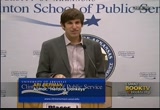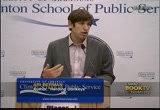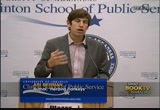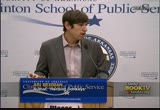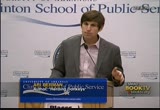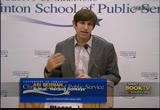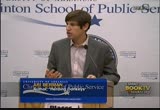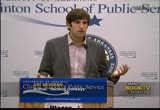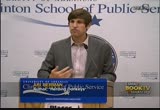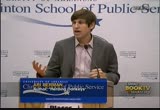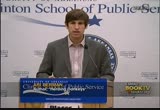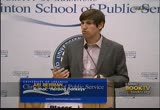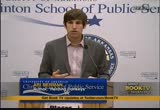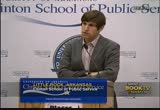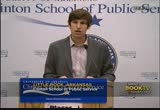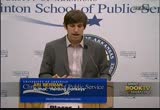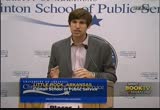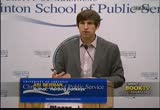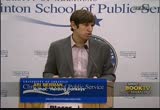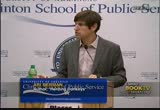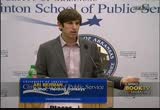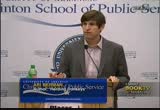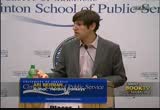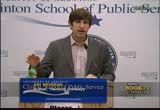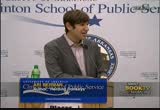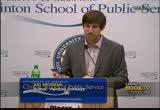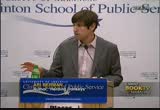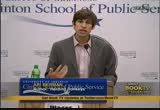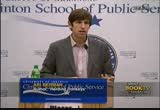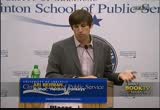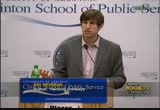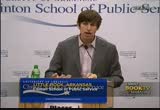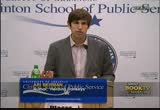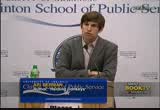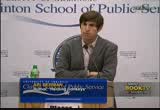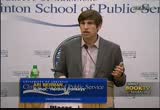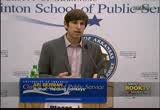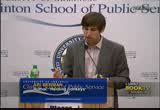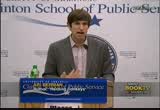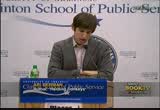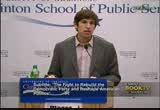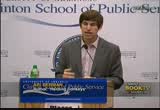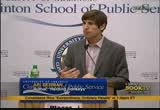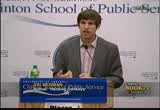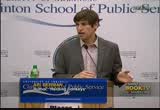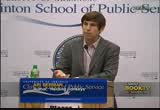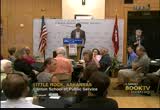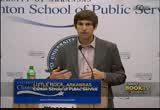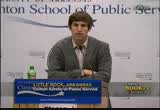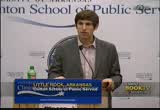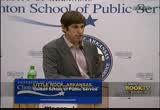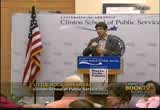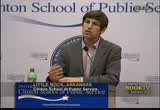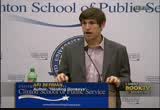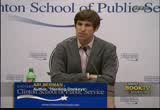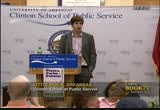tv Book TV CSPAN October 31, 2010 4:00pm-5:00pm EDT
4:00 pm
4:01 pm
much like the corner of the blog in national review, whereas the ideal of it is i wanted to help show that there's a remarkable amount of ideological diversity on the right. if you go by the mainstream media, once you see someone conservative he basically described them and it's an undifferentiated, you know, homogenous mass of bigotry and hatred immorality is to eyeholes and a pillow case for being clansmen. [laughter] part of the idea was to show there's actually this very wide array of views on the right from, you know, various flavors of libertarianism and there's various flavors of libertarianism if you ever been to a gathering at cato institute and heard them argue. if social conservatives and everybody in between.
4:02 pm
and part of the i.t. was not to have 25 essays all crying barack obama because that would be boring. there was also george hammer and george will to show that young conservatives come from in multitude of different ways. some of them actually have to have fun in life and donated branches to crack a smile. into sort of of get a sense that conservatives are people, too. >> to watch the program in its entirety, go to booktv.org. simply type, proud to be right at the top left of the screen and click search. join us next month for in depth when jonah goldberg takes your calls, e-mails and tweets. >> contributing writer for "the nation" recalls of the democratic party wanted to decimate presidency and both houses of congress. the book, "herding donkeys"
4:03 pm
describes how howard dean's decisions and barack obama's presidential campaign attempted to make the democratic party more inclusive. the clinton school of public policy at the university of arkansas in little rock hosts of the event. it's an hour. [applause] >> hi, everybody. can you hear me? its absolute honor to be here. and i think, you know, we're on day four of the book tour. we kicked it off tuesday. and i personally don't think there's a better place to be talking about the past and future of the democratic party and little rock. and bill clinton's backyard. and i know the president said it was too bad he couldn't care. there is an interesting piece. i don't know if you guys saw "the new york times" today, but there is a very interesting headline i just want to show you. some in gop finds soft spot for bill clinton.
4:04 pm
which i don't think he would've necessarily see maybe 10 years ago. and they talk about peace in the interview all these republicans claim these nice things about president clinton's legacy. and i ask one of the people quoted was cumbersome and paul ryan, who is a rising star in the gop. and they say what about the fact to impeach him? and ryan says, i try not to think about that. so i think this is a good lesson for barack obama to be having right now. and the reason why i wrote this book is because i had covered a little bit of it before, but really the 2006 and 2008 present presidential campaign and in a lot of uncrowned in-depth reporting. i was fascinated by the ability of democrats. one was to bring in a lot of new people into the party. and she was to compete in all these traditionally conservative
4:05 pm
states that nobody thought they could win. faces like indiana. places like north carolina. places like virginia. you guys that arkansas had that for a while, but i think that was something that shocked a lot of people. i was interested in the grassroots political movement that came up really through the obama campaign and its relevance in politics today. and i thought a lot of the other books were going to be published about obama after the election -- while a lot were very good, i thought were going to be at the president or about his inner circle and they were going to tell this broader story of the grassroots from the perspective of the organizers and a list, which i thought was so important. and it's really mentioning her very nice introduction that story for me really starts with howard dean and his campaign for the presidency. and i imagine a fair number of you were westpark supporters, so i'm not sure how popular dean is in this room, but i think
4:06 pm
regardless if you like dean or don't like dean, i think it's pretty obvious now he really ran the first campaign and the 21st century, that his campaign was radically different from both george w. bush and al gore in 2000. and the interesting thing is that dean did not expect that to happen. he was a five term governor of remark. he wants to run for president. he wants to run for president to talk about a balanced budget and health care reform, two issues close to his heart. and he wants to be the candidate for moderate republicans, moderate democrats and republicans. kind of like john mccain. he wanted to be a straight shooter, tell it like it is. he'd actually done this up as governor. and so dean talks -- i was at the jimmy carter presidential library last night and i mentioned that team went to talk to jimmy carter and said what should i do? of a congressman says go to iowa. that's what carter did in 76 and
4:07 pm
never sent them come with the exception of bill clinton that's how most presidential candidates launched their campaign, retail policies and iowa. so dean starts going to iowa in 2002 and no one has any idea who he is. he's trying to stay in people's homes, trying to meet people and their like what's going on? who is howard dean? this is crazy. you're not john kerry, not john edwards, not joe lieberman. you know she is to be president. what happens is the war in iraq starts heating up. and all the major presidential candidates at that time are for war. john kerry is for it, john edwards is four, joe lieberman is for you. and howard dean is kind of saying to himself, this war is kind of crazy. it doesn't make a lot of sense for us to unilaterally invade iraq associate before afghanistan is getting off to a start. so he starts going to party gatherings in iowa and save the stuff and people start cheering. and they get kind of into it and they say, dean is onto
4:08 pm
something. but no one still really knows who he is. so there's this key moment in the book when he said this big democratic party gathering washington, the annual winter meeting of the democratic national committee. he flies in on a redeye, meets with his supporters -- he meets with essays about half an hour before and since one might going to talk about? and you seem to be campaign manager joe trippi who is a bit of a bomb thrower and i'll talk about them in the second when jerry brown's campaign against bill clinton and it's always kind of a hopeless insurgent. never wins, that history will repeat it tells. but in any case, he says he got to pose these questions about what's wrong with the democratic party, say what is wrong with the democrats. dean is like no, that's too controversial. how about if i just post these questions on what's happened to the democrats. so dean gets up at the dnc meeting. these events are very scripted
4:09 pm
affairs. everyone kind of makes nice jokes about each other, plays nice. i want to make a good impression. don't want to go. dean gets up there, lets his upper lip and says i want to know why so many democrats are supporting the unilateral invasion in iraq. ever mistake what is he talking about. he says the same thing about no child left behind and the same thing about the patient's bill of rights. and all of a sudden the room is kind of getting this message and no other candidate is articulating it. and the hands by essentially listing a lie from paul wellstone, which is when howard dean and i'm here to represent democratically at the democratic party. and the room just goes nuts. and it's interesting because he was essentially challenging the democratic tardy in washington right to its core, saying went to stand up for core democratic values. but the people in the room in some ways for the target of that, but they also believe
4:10 pm
that, too. at the democratic party had kind of started to lose its way. yes they were in power in the 90's. they had done a lot of good things. yes, al gore won the presidency and had it taken by the supreme court. but at the same time they were slow to react to the bush years and stand up to the extremism of the bush administration. and once dean articulated that, his campaign just took off and it went viral and a way that no one had really seen. and i think within a matter of months basically, dean was in some ways embodying a new kind of politics, which i talk about in the book. there were a few key planks of this campaign, which dean didn't start. dean's didn't set out to do but came up around it. when was the idea that you can mobilize a lot of people really quickly over the internet. the other was that volunteers could accomplish so much more for your campaign than just having political consultants. the other was that the playing
4:11 pm
field could be leveled for seemingly cathartic candidates that was different than previous waves. and i think as the dean campaign evolved, and other interesting idea with democrats had to go fight everywhere, including the so-called red america, stand up what they believe and articulate some core principles. the dean for example was adamant about going to idaho. i start chapter one within going to idaho in august 2003. his stuff is like your crazy, howard. he darty been there once and he wanted to go again. and so, people just did it grow from there he was visiting so much. and so, people said what are going to idaho? he gets off the tarmac and 500 democrats are winning or holding signs saying dean howard for president. that showed what he was trying to do. the interesting thing and this is how it relates to the clinton model is that dean had been a
4:12 pm
very devoted clintonite. his role model was bill clinton. he was for free trade. he was for welfare reform. he was for the death penalty. i mean, they were both centerleft democrats. the dean wanted to be like bill. i was his role model. as his campaign took off, dean was placed in stark opposition to the clintons because the clintons were thought of as the washington establishment and dean was thought of as the insurgent. that's not necessarily what he wanted to do, but that's kind of how about race. part of the reason that happen is because these new insurgents but came up for the party, they respected the confidence of bill clinton in the 90's, but they also felt maybe the strategy of triangulation wasn't as affable and the bush era because her started out so far to the right that if you try to meet them in the middle, he was just going to drag you further and further right. and that's what happened with the bush tax cuts were example.
4:13 pm
okay basically there was a lot of lessons to be learned, but now it was a new era and everyone had to adapt including the clintons to that. and it's interesting that this incredible amount of innovation. the irony is dean have this great campaign organization set up in every state but iowa. and hillary clinton in some ways made the same mistake four years later and he was talking to bill clinton as he was really getting -- dean went from nobody to buy about november 2003 everyone was going to be the nominee. remember there was a piece in "new york times" same way dean can still lose. everyone was like what? no, he's winning. forget about it. dean was still periodically talking to clinton and clinton told and listen, if you want to be the nominee come you have to act like it. you have to move from insurgent bowed to front runner mode. in dean could never do it. i remember i was in iowa three days before the caucus. i'm actually from iowa site been
4:14 pm
there a lot. i was there before the coxon went to see dean speak. his opening acts were jean genet and change buffalo. i said i got off i want these people closing the deal in iowa. it's kind of weird. and john kerry is barring the state what this with though. john roberts has these crazy aspirational town halls and making new age touch everybody event. and dean is just kind of out there. now, sorry, that's not what i meant. but again, these are different connotation. so essentially, and dean was right, but he was intoxicated by these insurgents and he could never pin that. and so his campaign falls apart in iowa. everyone knows what happened. horrible third-place finish. the scream -- the scream again is the first immediate takedown of the 21st century because if
4:15 pm
even a really loud room, so he's yelling, but the ceiling to hear over the crowd. when he said the clip all you hear us and yelling like what is this strange than take doing yelling? and all of a sudden it's everywhere, instantaneously and it takes a week for them to post the other videos. by then it's too late. jay leno is saying, you know, cows in iowa have mad dean disease. it's over for him. and basically everything he built jets destroyed pretty quickly. in fact, that is the conventional wisdom in washington. there's a quote saying he'll melt and melt until there is no more howard dean. and so for me what was fascinating to see your leader dean is back and he is chairman of the democratic party. how did that happen? i thought this guy was done. the interesting thing is dean speaks at the 2004 democratic convention and he speaks on the same night as the young state senator named barack obama. and during the convention didn't
4:16 pm
have a meeting with the state democratic party chairs. and they're mostly from states either to read or to blue to give any money from the democratic party. and now, new york, california or it's like texas or georgia or someplace. and they're all saying to dean, we can't even get a bumper sticker out here for john kerry. i mean, we are starting our resources. and dean has just come from campaigning all these places another's democrats everywhere and says this doesn't make any sense. so i kind of light bulb goes off in his head the same week that john kerry and john edwards are being nominated the electoral map has been set in stone and the entire election will be found on the playing field of ohio, with no margin for error whatsoever for the democrats. they all moved down to florida in 2000 comes to ohio in 2004. two key states in the presidency go that way. dean starts a note to a 50 state strategy. i want to rebuild the democratic party. and that is a surprisingly controversial thing.
4:17 pm
and the thing is controversial for two reasons. one is if you remember back to those days after 2004, we were in a red versus blue battle. i mean, blue states called the red states jesus land. i remember as as i was in new york and southern females. and the red states that the blue states were contributing, were turning america into a godless country. and so, this was supposed to be an inevitable battle. and i grew up in my u.s. went like this is crazy. they're red, blue, they change. the country is obviously much more fluid than that. and i think dean's father, too, but it's not so set in stone, but he had a hard time getting that across to the pundit. the other problem was the democratic party has never functioned that way before. they hadn't really ever prioritize local party organizing in such an expansive way. and so, he runs for chair of the party and basically all the major established players oppose them also.
4:18 pm
there's a nice scene in the book where jeanne is running for chair and this writer on bush's inauguration and there's a party at mark penthouse, hillary's top campaign manager in georgetown. there's a quote that says there was a ton of positive energy except for the fear and loathing of howard dean. in so these guys didn't want him to be chair, but what he figured out was there was not only the rank-and-file they rested and wanted something different, but all these new people becoming part of the party. i think some of the traditional establishments have had a hard time really relating to that in understanding it. there's an interesting quote from james carville and the book, who really never liked dean. carlos is the thing that something about this this is this supposed to be a big deal chair the party. are supposed to get a phone call and that's who you vote for. and i think in some ways that was a decent summary of how it had been previously and how things are changing. i think the establishment in
4:19 pm
washington was slow to relate to that. and i think he saw some of that in 2006 when dean actually did his 50 state strategy and how this big fight with rahm emanuel, who was chair of the democratic congressional campaign committee. and he basically went to see dean is that you need to give me money for my targeted races. that's where the battle is that. and rahm had a point. rahm was denigrate job at the tray. dean had a .2, which was left to both. let's build up the party and that will help everybody. let's let this experiment work and don't just discarded in the first major election or we'll never know if it will work. and a former dnc chair, joe andry told me rahm forgot that dean didn't work for him. benefactor was an independent power base and that was at that point the dnc. and i mention all this is a prelude to the obama campaign because the obama campaign -- again imagine there's a lot of people in this room that
4:20 pm
supported hillary clinton. so i'm only going to talk about the clintons in terms of things that i think maybe they could've done differently and maybe it would've turned out differently for her. and i think one of those things was that, you know, the obama campaign -- obama knew that there was a certain segment of the population -- no one knew how big, but wanted something different different and it didn't want for whatever reason didn't want hillary clinton. they wanted alternatives to her. and they had to figure out very early on, how are they going to bypass the establishment because hillary added by the major support for justified reasons starting out. so obama is like how can i get around not? and the best model for him with howard dean. because dean had crashed and burned as presidential candidate. he gone pretty far and done it successfully is chair of the party. and so, there's an adjusting theme in the book were the campaign manager is meeting with
4:21 pm
a young new media person named joe gross virus. and rose phares worked on the dean campaign and was head of new media for howard dean at the dnc and was brought in for precisely that reason. and he says tuberose fires, hillary is all the money, all the endorsements, so we have to do it another way. the only way it's going to work if it's bottom-up and organic. so can you raise a bunch of money over the internet basically. gross virus says yes but we have to do it by creating a grassroots movement is going to inspire people. you can just have them for money. you have to give them ownership of the campaign. and that really became the genius of the obama campaign, without jamal bottom-up politics with top-down structure, which dean couldn't figure out how to do and obama did figure out how to do. and i think like dean, obama was some sort of an insurgent. laking he started out with not a
4:22 pm
lot of support of establishments. like dean, his calling card was his opposition to the war in iraq. obama doesn't give a speech in the war, there's no rationale for his candidacy because hillary had supported the war at that point in time and that was his major area of distinction, which kind of blended together as it got further along. at the beginning, that was the key moment. and so, if you look at that, there's a lot of similarities, but a lot of differences, which is that obama is not a natural insurgent. that's not his personality. he's a conservatory guy. he is not a fiery, populist. he actually doesn't like doing populism which i think will talk about later in this kind of hurt in these days. and so obama figured out how to be sort of a moderate. he figured out how to take the best of some of the innovations, but also figure out how to blend it with words had been done previously. and i think that incentivize -- they were incentivize to pursue
4:23 pm
things differently, where is hillary clinton because she started off as a front runner wasn't. she basically thought she could run a traditional 1990's campaign and win. and i think she thought that for good reason because that's what her husband did. and that was, you know, the model. that was the only successful model. listen, al gore distances himself, so the feeling was bill clinton is popular. i'm going to be -- you know, some of that will translate to me. i have a record. i put my head down, got all the establishment and that will be enough. i think it turned out it wasn't in an interesting place to look at this for south carolina, which i talk about in the book in the primary. and in south carolina what happens is the obama people come in and the way south carolina politics had worked which works in a lot of places you basically have to buy people off. you have to give money to the preachers and put them on retainers as part of your campaign and the poke at the photo from you.
4:24 pm
and so, there was this big pastor in colombia at the obama people wanted. get a 10,000 member congregation they went and said okay, we'll give you 5000 bucks a month. he said all right, let me see. he calls hillary. the campaign gives him 20,000 a month. so they're like zero, we can't compete with that. at the same time, their world is younger obama organizers in south carolina, a few of whom would come up through dean. and they wanted to do a completely different bottle, which was to hold a house meeting across the state, which is what dean had done so successfully new hampshire. he said listen, or have to start because many of them will grow the campaign. we'll spread at house by house by house and it will create this ripple effect. what we'll do is we'll train volunteer leaders to essentially from the campaign because he won't have the money at that point in time to just buy off every pastor. and so the interesting thing is the advertising went on for a while and when obama wins iowa -- and i was shocked
4:25 pm
because i figured people were looking at polls in iowa and everyone kind of knew there was a good chance obama could win. but two years after the election, i just happen to be before i went to new hampshire i was talking to some friends of mine who were primarily actually republicans and they haven't been following the campaign closely. they were shocked barack obama won iowa. they could not believe it. it was the craziest thing i ever heard. that's when i donned when economy people were starting to pay attention. and that's what happened to the obama campaign is suddenly there was an explosion of energy and obama because of the house he had created a grassroots structure that could be multiplied so quickly. and so, once it became the struggle for people, obama was amiss with a well-placed position to just ratchet up the campaign and it just grew and grew and grew and grew to the point where nothing could stop it and bill clinton tries to belatedly come to south carolina and save the state for hillary. but at that point it'd just gone
4:26 pm
too far. you saw that replicated in so many states as the primary when i'm that obama because he had this bottom-up base comparison to states like idaho and just doing incredibly well. and the clinton campaign was never prepared for. it was never part of the playbook the strategist mark penn had outlined. her playbook was essentially, you know, when iowa, when new hampshire and go from there. but the interesting thing about the clinton campaign as it ended up helping obama because by first winning new hampshire i think was the best thing that ever happened for obama because he was not prepared to be president or run for president before that. he just hadn't been properly -- he had been through the grinder. and so, not only that, but when i talk to obama in south carolina counties of the best thing that happened for us was new hampshire have motivated people to work even harder now. and the interesting thing is new hampshire was the one state were hillary had a strong grassroots organization because bill
4:27 pm
clinton's ties there. so they had some organized obama there from the very beginning. and so, the interesting thing is that by prolonging the primary and refusing to drop out, what a lot of people were telling her and i were to refusing to shut down and obama people were telling him to comment that expanded the political battlefield is all of a sudden now on may 6, obama is in indiana. he's in north carolina. he's campaigning all the seeds and like howard dean did, he sees all these democrats there that are just going to vote in the primaries. they might vote and journal actions, made some republicans. and so he enters the general election once it happens with this vastly expanded political map. and i found that so fascinating to watch. i was in indiana for the last three days before the election. if you had told me at the beginning of the campaign i would be spending election day in indiana, i would've said you were crazy.
4:28 pm
i mean, the democrats haven't won in 1964. if democrats hadn't campaigned in indiana until 1960 basically, ever since bobby kennedy. and so, this was kind of a radical thing. i remember is him grant park on election. just to see that big video screen and show you a watching on tv or wherever you were, to see them announce all of these states going. they called indiana and north carolina later, but ohio and colorado and all these places you say wow, this is going to be an electoral landslide. this is something pretty amazing. and so, the question now posted on this blog a few days ago, what happened? that the question everyone is asking me. how do we get from euphoric moment in great part to the exclusion of the tea parties today into a situation where democrats are probably going to lose a lot of seats in november. there's a reason i made the subtitle of the book the fight to rebuild democratic party and
4:29 pm
reshape american politics because this didn't end after obama's election. there's a good quote that i see inside the book from will rogers is we need to be optimistic and democrat. and to some extent, that's what we're seeing now. and i just kind of briefly want to go through a few things that i think is maybe gone wrong with the administration. the most obvious, which i don't think they could have controlled any point is the economy. not only that, but the economy is disproportionately affecting the key segments of the obama coalition. i think this is a really major point because young people, certainly minority groups, single women. i mean, this was kind of the backbone from day one of the obama campaign. and if they are struggling to get a job where they're losing their home, it's going to make them a lot less likely to either a have time to volunteer or be motivated to do it. and i think the corollary of that dough is the administration obama when he ran, his model was to be a new model. he was going to get millions of
4:30 pm
active obama supporters to be part of governments in washington, to affect the legislative process. and they were going to create a grassroots people powered army that was going to be able to afford the special interest in washington. that is essentially a promise argument against hillary is that coming in now, you can't fight the special interest if you're part of us and you have to have an ultimate power base. obama claimed he had it and clinton did not. the interesting thing is if you look at the team that obama surrounded himself with an i hate to say this, but i think it starts with the staff, rahm emanuel, which is if you only surround yourself with the insiders, it starts to take a toll, which is not to say he didn't need some people like rahm in this white house. but i think in some ways they kind of started taking it over. and they didn't make a similar space for the grassroots part of it. you needed to mix and i think
4:31 pm
obama in some ways over learned the lessons of the clinton years, skip and i talked about this earlier, which is the clinton people came in and said this is how will be done and they came in with a lot of smart, brash kind of insurgent types. a lot of people from arkansas to want a well regarded by the traditional washington players in the capital. and that was when clinton. they said we need to pick all the washington capitol insiders and put them in our administration and we will be the same mistake. the only problem is obama was 50 points higher than nancy pelosi or harry reid. he was the one with the political capital. he was supposed to be the reformer. and i think they bought into much of his views on washington without really trying to change it, without trying to change the legislative system and to get the people involved. i think one of the interesting things that's indicative of this is the fact that howard dean did a good job with the administration. i mean, under dean, the party picks up six governor seats, 14 senate seats, 55 house seats, 15 jacinta chambers.
4:32 pm
on election night this was the first page my book. obama tells dean after his grandpa or speech, or safety strategies to lay the groundwork for my campaign. nothing. you know, i think the fact that dean wasn't a must-have in the demonstration, but i think the fact he was snubbed in snubbed so publicly, he wasn't even there when obama announced virginia governor tim kane as chief of staff. well, dean than american samoa, which is true. dean is in every state and political territory. what they didn't say was he would've postponed his trip to be there when he announced mccain. the white house are decided they weren't giving dean a job, so they didn't want to hug him have a job or not. one step led to another. that personified in some way a broader exclusion of the grassroots base because they know someone with a lot of credibility among party rank and file for could've been a useful ambassador.
4:33 pm
and instead, they kind of said some of those people are linked heavily more people like rahm, which diluted obama's brand. and then what they did try to do, which was interesting, if they put some of the obama organization inside the party of the democratic national committee and that would be the grassroots force. there were two problems with that. one is right after the election was the key times when you had to mobilize people. so many people a new one to get involved, wanted to know how to help. essentially what they were told of by them up. come to the evacuation. that was not meaningful participation. so in some sense the same sense of ownership that these people don't in the campaign, they they had to figure way to give ownership in the white house. unfortunately organizing for america, which was a campaign took a long time to get it up and running. and once it got up and running, they weren't really given the freedom to organize effectively because they weren't about to go after democrats were blocking the president's agenda appeared well, keepers of the president were bought at democrats.
4:34 pm
it wasn't only republican that got us into trouble. it is people like ben nelson. i had to say, people like blanche lincoln. and so, essentially the interesting thing is there wasn't a lot of key behind the organizing. at the same time they started to do an end run around the party establishment. the thing is the party had really been built up under dean. you know, they had 200 organizers. they were much better condition. after the election was organizers contracts expired, so they left. and it took a long time to fill that vacuum. i think obama could have easily just kept the 50 state strategy. he says what dean is doing great he could've done both. i would've both given him the strength for bubbles in the party and would've given him his own mobilization would've been maybe out to the dnc or affiliated or allowed them to push for his legislative policies. and i think that would've helped them with a tea parties emerged,
4:35 pm
which is what i'm going to get to. i think the two parties are interesting at this point and it doesn't really get made often enough, which is they copied to dean and obama playbook. they absolutely saw what dean was doing and what obama was doing and said we need to do that. we need to get in the streets and mobilize and make republicans pay attention to what we are doing and make them take us seriously. if you look at the very moment when the tea parties will emerge, it was august 2009, during the health care debate over the recess. and remember, democrats recessed without a health care plan and without knowing what the president for public option, if he was why was he fighting fighting for a quite see, what was going on with the negotiations? this thing was like dragging on and on and had become very dysfunctional. but he assembled a very sort of dysfunctional, was running with guest to curb your at the same time obama supporters -- i was in colorado springs over the recess, which is on the most conservative part of the
4:36 pm
country. i was hanging out with obama after this, but it's surprisingly well. they got 41%, which sounds terrible, but that was a significant improvement and they were really psyched about it. now they were saved okay, what can we do on health care? and they didn't know. and so at the same time, and that obama's movement was being demobilized, the right was mobilizing. i don't think it's coincidence. i think mobilization on the right was a direct response to the demobilization on the left. and i think i've created somewhat of a situation of a symmetric warfare, where the right is really mobilizing and energized and democrats are mobilizing and aren't energized. in that situation essentially plays about for a long time. you know, were still in some ways playing out today. and it's interesting and there's a quote in the book that insert the epilogue with faisal linsky, who of course is a famous community organizer who has become an unlikely favorite of the tea party.
4:37 pm
and linsky has a quote that says the first part of changes controversy. you can't get away from the simple issue of all changes controversial and it creates heat and friction to keep a movement going. and in some sense, that was what the clintons were telling barack obama, but listen, the right is going to try to destroy you. you better be prepared for it. and obama says no, i'm going to reach across the aisle. i'm going to be a bipartisan bridgebuilder. he really tried them was sincere. but once i broke down, once chuck grassley was part of the gang of debate and saying that obama was going to pull the plug through the health care debate, it was obvious the right was a cooperating. obama needs to go back to his own mobilization and say okay, when a turf war in the trenches and i need my site to come out. another thing with the midterms a month away, but it's not just us which you can turn on and off. the interesting thing is i think there's some lessons here, which
4:38 pm
is -- i think the tea party is proven that al and the obama campaign is proving it, too. which is you can't just take your people for granted. you can't tell them they're important and ignore them was here they are. you need to keep them involved in some way in the administration. and it goes both ways, which is a lot of people in the obama movement or the coalition, whatever you want to call it, trusted obama to do the right thing after the election. zero he'll appoint the best people. he knows what's best. residents get put in a bubble. the need to be pushed. it's the same after your post until the famous labor lever, i want to do it now, nick b. do appear to some extent the progressive movement and the obama supporters need to organize on their own and realize in some ways an outside power like ronald reagan with the new right and some of those activists would actually help them. so instead of disparaging the professional left, figure out how to use them. these people want obama to
4:39 pm
succeed in its agenda, but they want his agenda to be as bold as possible and pass. they don't tswana to linger. so there's frustration on the base. some of that frustration is real. and instead of just saying -- fill yourself whining like vice president biden said, give them a reason to work. it's not inevitable will always be in the situation. because when democrats they were 30 party? my responses you had one. it was the obama campaign. with the democratic party after the primaries, when the clinton people and obama people were united in their redefining the political map in all these different states. and i don't think that's inevitable that will necessarily go away because i think the interesting thing is both the right and the left now agree that grassroots politics were obama proved in his campaign and they're now proving it in opposition. so that's a different situation we faced before.
4:40 pm
what's less certain is how does it play in governments? can a plan governance? i maintain that occurred and obama didn't really try. and so, the jury is still somewhat out on that. but i think what's very clear as the method of change is still very powerful. i mean, the tea parties have the same message the obama campaign really had, which is want to change our country. we want to take our government back and actually take our country back. take back america with the slogan of the dean campaign. that's a different connotations about the tea party, but there's no doubt about it that one of obama's top pollsters just holding the book, we don't own the market on change. and so, it's important that obama keeps reject dean. i'm not going to secure play monday morning quarterback and the connive of the answers for barack obama. i'll say what i've learned in reporting for this book, which is that obama was elected as a change agent and the more he positions himself as change in washington, the better off i am kilby.
4:41 pm
and i think a corollary of that and this is a really interesting thing the democratic party -- this is a key issue the democratic party. now it is what do you stand for? what are your core principles? because obama has passed for all his flaws be pretty full by the legislative agenda, stimulus, health care, financial reform, skipper has reminded me of stuff i thought about which is national service, expansion of the student loan industry for example. the democrats are really talking about that. they seem to be running away from there. come to shreds. same for the white house on health care. you can't just have health care and assume it's going to be popular. you have to everyday go out and educate people for what you did it and how it's going to help people. and if you don't do it, then the right-wing populism of the tea party, which blames government is going to be very powerful. the interesting thing for me as i thought obama after the election, just like in the
4:42 pm
campaign would make an affirmative case for the power of government to help people at a time of need like fdr had been during the new deal, democrats have done so effectively through the years. it's interesting if you look at obama's speech at the inauguration and i'm sure some of you were there, too, wishes to send in a speech it's not about whether government is too big or too small. it's whether government works. i thought he was going to make a very pragmatic case for the power of government. and i thought if he did that in tangible ways with this policy, that he could prevent a lot of the right-wing populism from spreading. et cetera top of his obama has been made this argument and now his agenda is synonymous with the bailout, which is crazy to me because the bailout wasn't his idea. he didn't do it. that was bush's bailout. but at the same time, he is getting hit for things that he didn't do, which i think was why he hasn't, tried to distance himself from some of that and
4:43 pm
really get the democratic party to stand up for what they believe in. i think the interesting thing is in terms of the obama coalition right now, in terms of democratic party coalition is the democratic party is very good test for outlaws. there's another famous that no other political party, i'm a democrat. the great thing about the party is the ability to win in all these places. but if the people you elect are just going to go back to washington to vote against all the key planks of what the party is for, then i think you have to question isn't worth having? and i think that played out so much when i was down here in arkansas during the lincoln primary, where people were saying okay, what does it mean to be a democrat and what does it mean to be democrats in a red state or red leaning state? and i don't think that debate has been resolved yet. i think one thing that is hopeful and the book ends with a section on taxes, which is that
4:44 pm
you can't just be cyclical. you have to take a long? of this stuff. and i was one of the smart and 13 dead and is one of the things the obama people have tried and are trained to do, which is to look long term. where are the demographics changing? were the opportunities? in my mecca during four years, but start organizing. and do for example texas, tons of votes -- democrats in texas facts they can have a functioning of electoral majority for a very long time. i think that's really smart to do. and i think they need to keep doing that. they need to keep campaigning in georgia and campaigning in idaho and coming in though, maybe they'll lose in 2010. maybe 2012. if they keep making an effort, eventually some of those states will swing back to democrats. i also think will be importunate
4:45 pm
still develop also some sort of progressive institutions that are recommended better democrats elected, which i think is what some of the progressive coalitions try to do with the halter race. and the final thing i'll just talk about is what's going to happen in 2010. i don't really know quite frankly -- about a genuine quite knows. i think democrats know it's unclear if they hold the house. i think probably not, but i'm not sure. i think the interesting thing is okay, is it a good thing if obama loses the house? this is a question a lot more democrats are talking about, which is interesting. skip and i were talking earlier. i think there's two possibilities and this is where the clinton example becomes very illustrated. obama is facing a lot of similar administration. he got a lot of things done that didn't seem to be that popular at the time but later proved prescient like his budget. i think obama an alternate stimulus is a similar situation. i think both of them had trouble adjusting. they were both were watching
4:46 pm
outsiders had trouble adjusting to the climate of washington and trouble working with the hill. and i think both of them are facing major losses in the first midterm elections. and i think clinton responded well to 94 and he was helped in a great way by the overreach of republicans. and that's one reason why losing the house by not be so bad because certainly how the useful foil. are these people be elected. some will propose a major conservative piece of legislation. obama can highlight that and say listen, and the reasonable one. i'm the guy who's in the middle. and that's what obama has wanted to do from day one, but he said trouble communicating them. part of that is because he positioned himself as a different democrats and obama avoided that whole ideological argument. so obama was all thanks to all people, which is the genius of the campaign. but sometimes an oppressed as president you have to show
4:47 pm
exactly we were in a thing people don't have a sense of sort of obama's character, but they are not a sense of used politically. some democrats on how the fence and health care debate that really hurt because they're democrats and it got to get him help and fight for a public option if you're for it. and obama was -- i'm above the fray. and i think he realizes now you can't do that anymore. he is the leader of the party for better or worse and it's going to rise and fall based on what he does. so i think in some ways was in the house could be good for him. the counterfactual is that they start investigating him like they did for clinton, man, if you thought the clinton years are about to wait till you see the figures they do for obama. certificates, every crazy right-wing rumor you could imagine we'll get a hearing in congress. and i think that's going to be frustrated and disappointed, but again it may in fact clarified where the republican party is right now. and that may be nasty and machine, but i think it may help the president.
4:48 pm
the other side of the spectrum is if obama decides instead of trying to cut a lot of deals for republicans with a smaller majority, because he could try to cut a smaller deal and sam going to cut deals on the deficit, cut deals on social security, what the bush tax expire. and then i'll regain my standing with republicans. or he could say listen, i passed a lot of stuff through the house already. 420 bills have passed the house and are dormant in the senate. and it's because of the and misuse of the filibustered by republicans. and if obama comes back with 52 votes in the senate, which is i think about where to look at it, sooner or later we'll have to have this conversation, which is nothing can get done with the senate unless they're 60 votes. that's the new standard. and were paralyzed. washington is completely paralyzed because of it. and i think this is a conversation and the number of filibusters have increased double since the last time democrats were in the minority.
4:49 pm
i was gone to unprecedented levels. sooner or later if obama wants to have a transformative agenda, we have to have a conversation. he has to start the conversation. we have to have a conversation about how to get out of legislative gridlock. i think the conversation on the filibuster, regardless of what happens with the majority, i think his long overdue. and so, those are my parting thoughts with a very interesting political information when right now. i know everything is in flux and you probably have a lot of questions. i really appreciate you having me and it's really a thrill to talk. i hope i didn't ramble too much. [applause] >> thanks, ari. great political discussion questions now. right here, yes. >> you talked a lot about how grassroots was a good tactic against more traditional tactics back in the past couple of elections. but we're in a new political
4:50 pm
arena now with almost everybody using this grassroots motive and new movements popping up like petite party the third way, plus traditional republican and democratic. is that going to be information overload and 2012? and how come associate for the younger people who are just organizing our thoughts about politics. i mean, what's the effect going to be a modest 2012 going to look like? to have any ideas on that? >> as two separate questions. i think all is proven by the obama campaign and a tea party says you can't post a twitter message and click grassroots. you have to be online and offline. you have to build those two worlds. and so the reason why the obama campaign was so interesting and use facebook is because they know that today people to go volunteer and do things offline and they could bring in money which would allow them to build
4:51 pm
a traditional organizing and places across the country. so they figured out how to fuse both and be successful. you can't just do sort of astroturf grassroots. i think the republicans have proven that because it's interesting for a long time the writers try to do some sort of mobilization like petite party and they could never do it. in the tea parties came about in sort of spontaneous ways and motivated by some hard-core convictions. and i think that's the reason why it was able to be successful because there was underlying conviction and substance behind it. you can agree or not, but they believe what they believed. 2012 i didn't get this in my speech, but will impact the tea party in 2012. my feeling is this their appeal in wins, she's the nominee because nobody is going to be able to stop her. she's going to have so many tea party people out in effect for her and is going to be kind of like a situation where mitt romney shows up as 131 shows up in its 2000.
4:52 pm
you'll see that in every place she goes. maybe it would've been up to well and maybe she'll make a bunch of dots and this'll be the lack of substance will hurt her, but it doesn't hurt to get among republicans. i think the most likely as republicans generally tend to rally around the establishment of candidates. it happens almost every tend to nominate somebody. at what john mccain. cabin with hostile. it happens over and over and over. and mitt romney as a person this year. the problem i think that romney would be very difficult candidates in a bad economy because he's a business background and i think he did get a lot of sort of independent support and hold the republican party. and maybe even pick up some democrats. but obama basically passed mitt romney's health care bill. i was going to be an interesting question and i don't think romney has suited up how to answer how was obamacare different than romney care and every explanation i've seen of romney hasn't really answer that question. he hasn't differentiated himself
4:53 pm
enough from it. so kind of like what tucson the democrats. i think in 2012 are going to see a lot more of the establishment versus grassroots battle in the republican party. now i'm not saying that they're appealing event and the establishment because she is. but she also is and i think will be the candidate for the tea party and it will prove how much they really have. and then she can win the primary. can she win the general election? i don't think so. you never know, but i don't think so. i think obama will collect prohibitive behavior against palin. >> first off, thank you summit for being here. we really enjoyed your talk and you often a lot of great insight. there's been a lot of great talk in the media recently about potential switch up of maybe hillary clinton moving to the vp spot. is there any legitimacy to that? and if so, what effect do you think that might have? >> i think it's a ridiculous rumor. i don't think any high-level pillories. i was at an event tuesday in new
4:54 pm
york and huffington she suggested bob woodward sources might have been hillary's hairdresser. i suggested it might offend mark penn's hairdresser. last night so i think it's much more like hillary become secretary of defense to escape and i were saying, first woman secretary of defense and that would be powerful. should be really good secretary of defense. and if obama gets elected, she can still run in 2016. and if obama loses, she can run 2016 and will be the prohibitive favorite. either way she's not running at 2012. why would she want to be vice president? why would she say no then when obama was at its peak popularity and do it now when it's going to have a hard campaign? it makes no sense. it's actually kind of conversation that makes people dislike media. why are we talking about that? kind of where's the beef, one? and i think it's a total sideshow and i don't know how it got started, but i don't think it's going to happen.
4:55 pm
>> i want to echo nate thank you for being here. it's very interesting to hear you talk. i'm curious if you could share your opinion on the citizens united supreme court case and what effect will have and what you think if ultimate legacy might be. >> yeah, well it is a great article in "the new york times" about it and i've done some reporting on this, too. they think it's very, very, very worrisome because her politicizes already awash in money and already awash in corporate money and now it's just getting drastically expanded. and i think what you're seeing is on the right now, essentially a lot of third-party groups are trying to buy the midterms. they can swoop into a house seat, drop a million dollars in an ad and there is no recourse. and we don't know how effective those assets will be. we don't also backfire. the very fact you can do so easily now has just reminded in this dysfunctional political
4:56 pm
system to get worse. and so, you saw -- in 2004 actually democrats that a lot of outside money and it wasn't that effective. so someone is always better to do it to the party and the campaigns and control your message. at the same time, the factors now incentivize corporations to give money as scary. and it's not -- it's not being the way that exxon mobil is turning around and giving a million dollars check to tim griffin. let's play name out of the hat, tim griffin. it's more likely -- there is some blowback there. it's more likely to get a million dollars to a group like american crossroads gps. with american grassroots gps? does anyone know that it's run by karl rove? no. most people don't know that. so that's the interesting thing of the starts to get really murky. and democrats are nothing. we need to do this, too. and that's a worrisome situation. essentially the billionaire
4:57 pm
spidered out of both sides and now is exactly not the model that obama was predicated -- is predicated this campaign, ordinary people would make a tremendous amount of difference to their $5 contribution. there were two things you can do. the most obvious legislative fix is to disclose facts, which has failed twice in congress. it filled in the senate by 59 votes. again, should have been a failure. fifty-nine votes should pass legislation underscores my point on my way to discussion on the filibuster sooner than later. the other thing we need to do is start talking about passing to fair elections parts, which just passed the house committee actually. and it sounds like it will never happen, this idea that you can actually make federal law and incentivize small donations, but you know, you have to start somewhere. i think the only response is citizens united is to figure out a must to it, which is a
4:58 pm
possibility, it is unlikely the supreme court would do that. unless he can somehow overturn it and figure out alternate ways to level the playing field. i think the combination of disclosing for elections -- i would like when he gets back to washington after the midterms if he gets reelected, i'd like obama to have sort of a fight washington corruption agenda, where he really starts talking about the systemic problems in the links between the amount of money in our political system and what's going on in our economy. do you think it's coincidence there was a bailout with no strings attached? i mean, i think he needs to make the links between these teams as tangible as possible and try to get people motivated to do something about it. so like mccain-feingold, if there is a stirring it can actually happen. we must start the conversation now. >> any other questions? guess, sir, david. for a -- >> i'd like to echo my fellow
4:59 pm
students. at thank you for being here. it's been very interesting. all the talks of the strikes of the tea party movements of his other grassroots campaigns, does this leave you -- or is anybody talking about a possible multiparty system at some point? or extending the conversation, because like you said, having some of these people and government highlights the moderation of some of the people. thank you. >> people always say they want a third part in this country but a political system is incentive to do it. we don't do a parliamentary democracy and third-party candidates face all sort of institutional challenges. you know, from getting onto the ballot to the electoral college. i mean, ross perot was kind of the peak of this stuff and he got about as far as you can get. you know, i think we would be nice if we had a few more parties to fix it up, but i don't it's going to happen. in 2012, if sarah palin is nominated, i hate to go back to it, but if someone is a nominee will be a conservative
5:00 pm
republican. i don't believe obama is a liberal democrat. i believe he is a central lab democrat. but as he is perceived, which he is in some circles as a very liberal antibusiness democrats, which is an unfortunate sigma to put attached to them. i think you could see some space for a third-party candidate. who could kill off some of the more center-right republicans and maybe some democrats, too. but again, i don't think that person could
247 Views
IN COLLECTIONS
CSPAN2 Television Archive
Television Archive  TV News Test Collection
TV News Test Collection  Television Archive News Search Service
Television Archive News Search Service 
Uploaded by TV Archive on

 Live Music Archive
Live Music Archive Librivox Free Audio
Librivox Free Audio Metropolitan Museum
Metropolitan Museum Cleveland Museum of Art
Cleveland Museum of Art Internet Arcade
Internet Arcade Console Living Room
Console Living Room Books to Borrow
Books to Borrow Open Library
Open Library TV News
TV News Understanding 9/11
Understanding 9/11